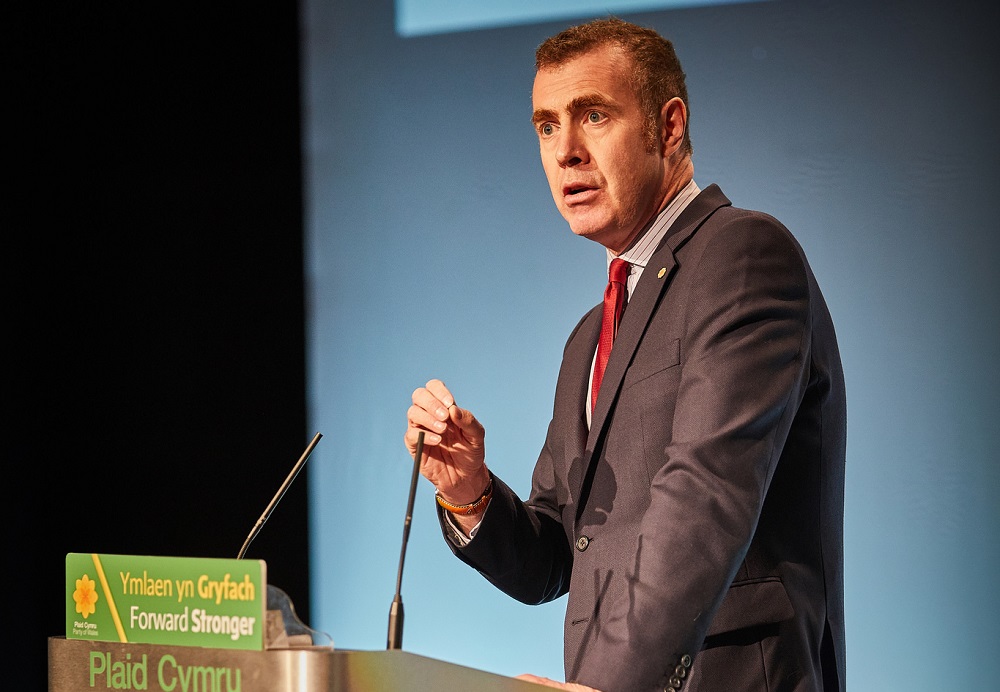A Plaid-led government would hold a referendum on independence by 2030

Adam Price AM
Welsh independence, like nuclear fusion, has always seemed some twenty years away.
When I was young I was never particularly content with that thought, and now I am on the cusp of fifty I feel just about the same.
My own party’s approach to this question for many years has pragmatically been that independence is a long-term objective.
Others have wanted to campaign for independence for a Welsh independence referendum today or tomorrow – which, though laudable, tactically would be lamentable, as almost inevitably lost, it would automatically set back the cause to fusion-territory and beyond.
But with politics worldwide in a vortex of upheaval, I have sympathy with the argument that we need a new strategy that is a much more meaningful staging post between now and never – a medium-term strategy for independence which won’t alienate voters in the short-term and that could actually deliver victory in the near future.
What should that strategy consist of? Answering that question means continuing to temper our enthusiasm with a heavy dose of realism. Independence is imperative, but it is also difficult to achieve.
Geoff Mulgan, Tony Blair’s former adviser, mentioned a wager to me while I was working with him at Nesta, that no developed democracy had seceded in the post-war period. You could make a plausible case in favour of 1960s Malta, but the general point stands.
Independence movements in the developed West have only chalked up a trio of near-wins in forty years: in Quebec, Scotland and Catalonia. We should examine each forensically to establish the necessary conditions for a successful independence strategy.
Support
Firstly, there needs to be a strong civil society movement towards independence. In the case of Scotland, it was the rich tapestry of groups, reaching into every niche of society that drove the Yes vote up to 45%.
The same was true in Catalonia where the independence movement was built from the bottom up – and equally in Ireland pre-1916 where a rainbow quilt of cultural and sporting organisations under-pinned Sinn Fein’s political breakthrough.
Yes Cymru and Nation.Cymru are valuable steps in that direction though we need much more.
Secondly, while you cannot achieve independence with political parties alone, you cannot achieve it at all without them.
In particular, you need the Government of your country to be run by a pro-independence party e.g. SNP, PQ, ERC/PdeCAT if you are to get a referendum which, in the democratic context, is a sine qua non.
A Plaid victory in 2021 is, therefore, an absolutely necessary first step in any realistic path towards Welsh independence. However, to form a government Plaid will have to win support from many people who will are not currently in favour of independence.
This was the exact dilemma that the SNP faced in 2007. Their solution was to commit to a referendum on independence, which meant that people who wanted a SNP Government but fell short of supporting independence could still feel safe in doing so.
This is the self-determination lock that most nationalist movements employ as a means to square the constitutional circle.
In the run-up to the 2021 election we will be presenting a prospectus for a decade of transformation – Wales 2030 – for the two terms of a Plaid-led administration.
We will be doing this in part because we believe that we need ten years to turn around a nation mismanaged by Labour, but also because we want to create a truly compelling vision of what a transformed nation could be like.
Goal
As part of that vision I believe we should commit in the first term of a Plaid-led government to passing the paving legislation for a National Futures referendum to be held in the second term of a Plaid Cymru Government, by 2030 at the latest, (though earlier if circumstances compel, for example, a successful Scottish Yes Vote).
This will be a multi-option referendum asking the Welsh people to decide on our constitutional future for the next twenty years taking us to the middle of the century.
2030 will mark the passing of a generation since the last referendum on a law-making parliament and it’s right that each generation gets the opportunity to choose its future path.
Independence will certainly be one of the options, as should the status quo, but the other options should be chosen by a Citizens Convention, representing all parts of Welsh society.
The Convention will oversee the work necessary to make each option an informed choice. This will include detailed practical work by independent experts, for example, on the economics of independence.
The goal, set out in legislation, will be that the Welsh people by 2030 will have all the information they need to choose their future for the next twenty years.
Twelve years will seem like an aeon for some. But for an eighteen-year-old today, it will mean that they could be a citizen of an independent Wales by the time they turn thirty. And it’s just fifteen years that De Valera took to turn Ireland from Free State to Republic.
The key as in Scotland and Catalonia is first to get a self-determination referendum on the statute book. The next step is to build the solid track record of a pro-independence government delivering a positive impact on people’s lives through progressive policies in education, health and the economy.
We will be asking the Welsh people to come with us on a journey of national emancipation whose destination they will decide. But for that to be possible they first must elect us their driver.
Adam Price is the Assembly Member for Carmarthen East and Dinefwr
Support our Nation today
For the price of a cup of coffee a month you can help us create an independent, not-for-profit, national news service for the people of Wales, by the people of Wales.





